As you found out in the first part of the Meditation Guide for Beginners, we can live during practice, more or less expected experiences. But as I said, they are normal and are part of the meditation practice.
You can access the link below if you missed reading the first part.
MEDITATION GUIDE FOR BEGINNERS
What you should know before starting Meditating
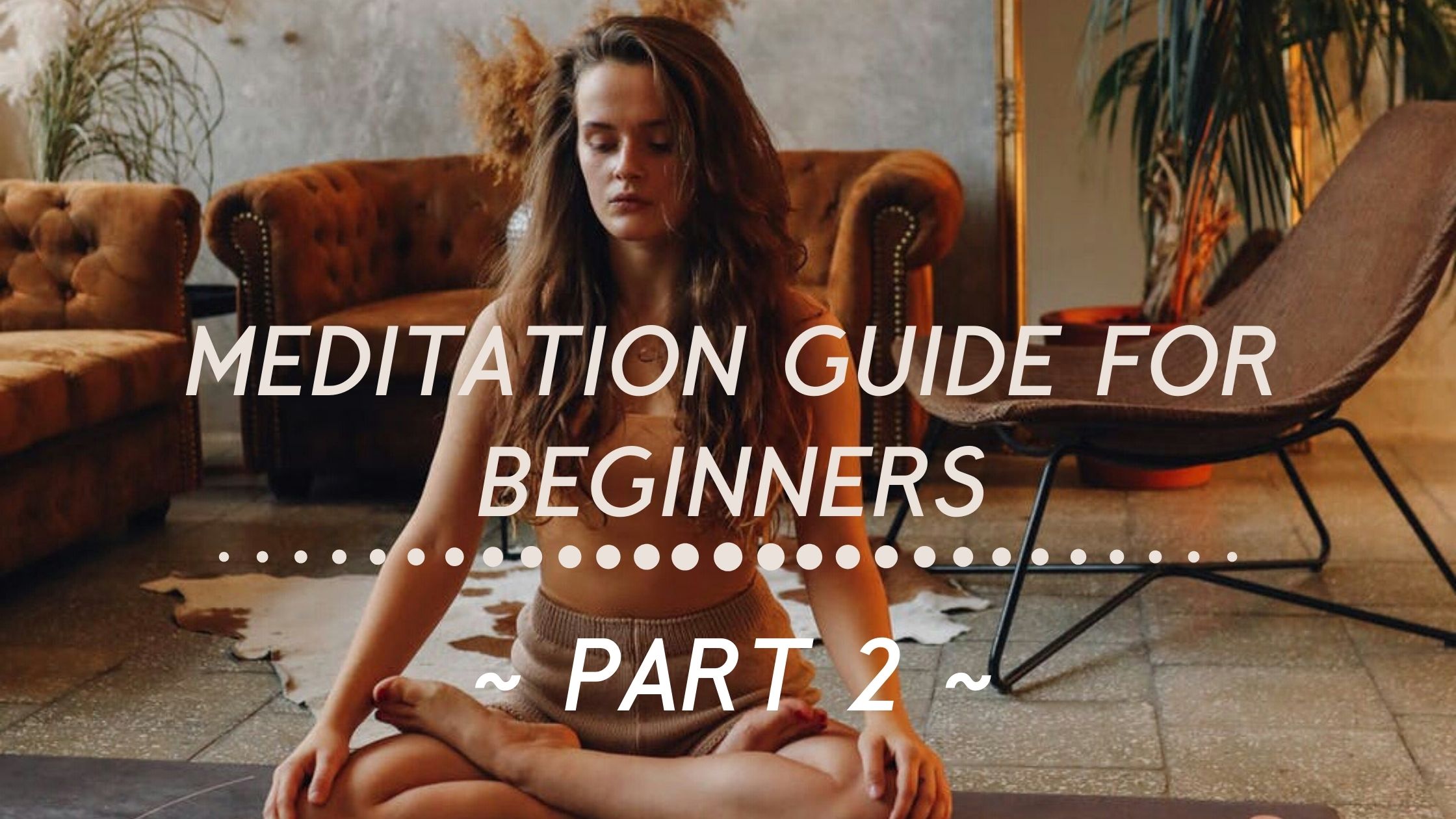
PREPARING FOR MEDITATION:
WHERE, WHEN, AND HOW LONG TO MEDITATE?
WHERE TO MEDITATE?
Meditation can be done anywhere and anytime (at home, at the office, on the bus, as you wait in line at the bank), but as a beginner, I recommend you find a quiet place with a special energy charge for you. A spot in which you will not be disturbed and where you can see yourself standing every day and relaxing recommended at least 30 minutes twice a day.
It can be a well-ventilated small room with nothing to do with other ritualized activities. Try to create a particular area only for meditation because, with more practice, that place will become filled with meditation vibes.
It is essential, especially at the beginning, to avoid everything disturbing as much as possible: TV, telephone, washing machine, etc.
WHEN TO MEDITATE?
If you are wondering when it is best to meditate, my answer is whenever possible. According to Ayurveda teachings, it is advisable to meditate every day at a fixed time: in the morning between 5-7 am and the afternoon between 5-7 pm.
I recommend taking advantage of the first hours of the morning while others are asleep because it is the only time when a few things can disturb you.
You can also take a break in the middle of the day. Regardless of your profession, you can always find a quiet place to spend 5-10 minutes meditating.
In the evening, I recommend you meditate after work. Thus, you will be able to carry out evening activities with family or friends in a state of serenity and good mood, and it will also facilitate restful sleep.
HOW LONG TO MEDITATE?
In meditation, the depth of the practice is much more important than the length of time spent. The simple fact that people have the impression that they have to start big scares them and makes them change their minds to meditate.
At first, you can start with only 2- 5 minutes at a time. Just sit still and do nothing. Important is to START. From there, increase gradually the length of time of meditation. You will see that as you progress in practice, you will want to extend the duration of each meditation session.
CLOTHES
I recommend wearing clothes that are as comfortable and light as possible. During meditation, you want to relax, and some clothes in which you do not feel comfortable can be a reason to disrupt the practice. Also, depending on where you practice meditation, you can do it barefoot.
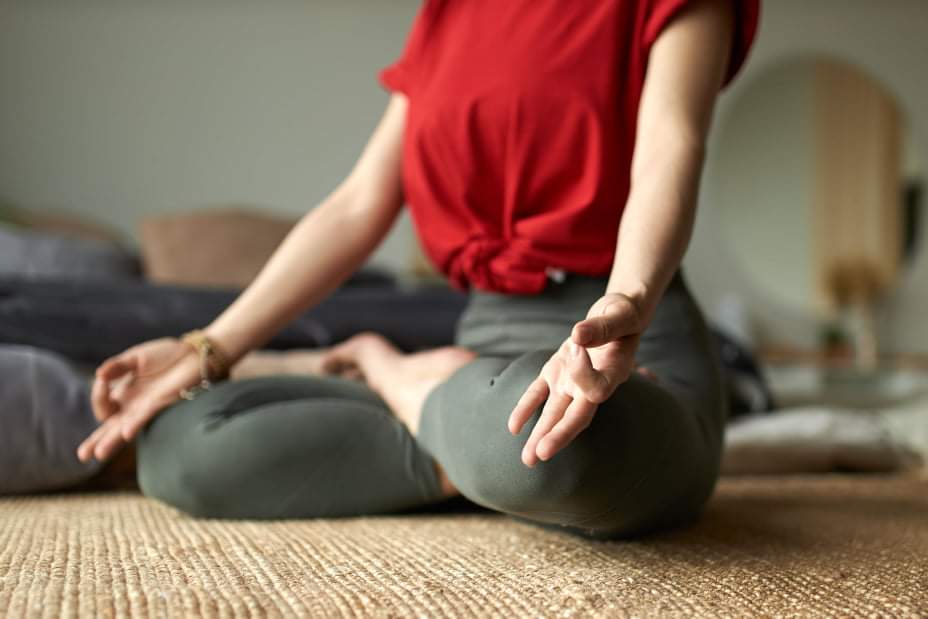
Sursa photo www.freepik.com
A PROPER BODY POSTURE
Meditation can be done directly on the floor, or a chair, and the body position should be as comfortable as possible throughout the practice.
ON THE FLOOR:
You can meditate in a lotus or cross-legged position (if your body allows it). It is essential to stand upright, with your spine erect and your muscles relaxed. Keep your chest up to facilitate normal breathing, your shoulders slightly back, and your chin parallel to the floor. It can be difficult for a beginner to keep your back straight for a long time. If this is your case, when you feel the need, you can use a pillow under your buttocks, or you can lean your back against a wall.
Meditation can generally be done with open eyes, but most practitioners prefer to close them. This is also my recommendation for you. Especially as a beginner, the risk of being visually distracted is much higher.
ON THE CHAIR:
To keep the spine and the chest open, sit forward, with the hands and palms upright, at the junctions of the thighs and abdomen. Keep your legs slightly apart, with the soles on the floor.
Ensure your comfort always because if you stay comfortable, you will meditate; if not, you will most likely have interruptions. But whatever the discomfort factor is (numb your legs, you feel the tension in your neck area, you have itching, you feel pain in the lower back), do not try to resist them.
Just deal with that discomfort and slowly return to the meditation exercise.
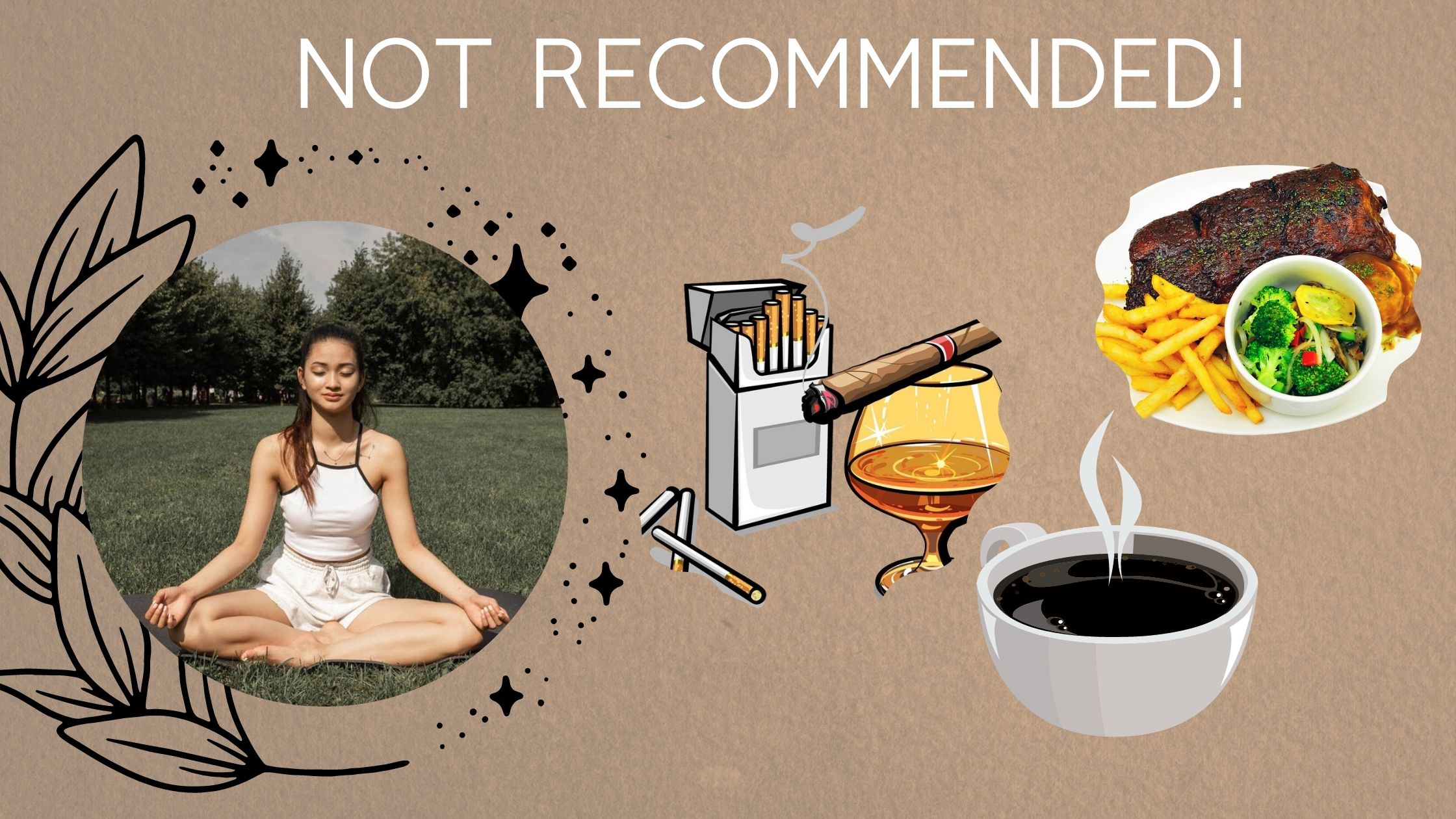
NOT RECOMMENDED!
- Do not meditate under the influence of caffeine, alcohol, or drugs because they will prevent you from living authentic experiences and blur the clarity and positive effects of meditation.
- If you are agitated before meditation, waiting a few minutes to calm down is recommended. Do a body relaxation, and take slow, controlled breaths to calm yourself.
- Meditation is not recommended immediately after a meal. Wait at least 30 minutes after a light meal and up to 3 hours after a heavy one before meditating.
- Do not think that you have to do something special while meditating or that you have to live a unique experience. As I mentioned throughout the article, you can see the transformation when the practice is over and you continue the daily activities. You will notice that you will become much more creative, intuitive, friendly, and generous, with greater love and appreciation for yourself, and much more open to opportunities.
- Avoid criticizing yourself. Whatever you experience during meditation is normal. If you do not resist and be open to the unexpected and unknown, you can be sure you are meditating correctly. Just enjoy the experience!
DEVELOP A DAILY MEDITATION PROGRAM
Let meditation become a daily ritual if you want your life to change. Many people avoid or postpone meditation for various reasons. In most cases, they remember to meditate when life challenges them, but after a short time, they forget about it.
It is not the same to meditate every day, starting with 2-10 minutes and increasing as you deepen the practice, with a meditation done in a day for several hours or occasionally when you remember. Only when meditation becomes a daily program will it become a habit, like washing your hands or teeth.
That is why I recommend you treat meditation as a series of activities that you perform naturally without doing them scheduled. For example, you wake up, go to the bathroom, to the toilet, wash your hands, face, and teeth, make coffee, interact with family members, prepare breakfast, etc.
You do not do all these activities related to time. Instead, you do them naturally as a ritual you have had for a long time. You do not say: “It is 6:30 am, now I have to brush my teeth. It is 6:32 am, and I have to make coffee.” That is why, to avoid skipping meditation, consider it such an activity.
The easiest way to stick to the meditation program without effort would be to wake up, go to the bathroom, and immediately meditate. Thus, you will start the new day in a state of inner peace and greet every moment of the day with serenity, energy, and efficiency.
For the evening meditation, as I mentioned in the previous lines, I recommend meditation after finishing work. You can take a shower and then meditate before starting any late activity.
Try to use these simple tips, and you will see how easily you can make meditation a daily habit.
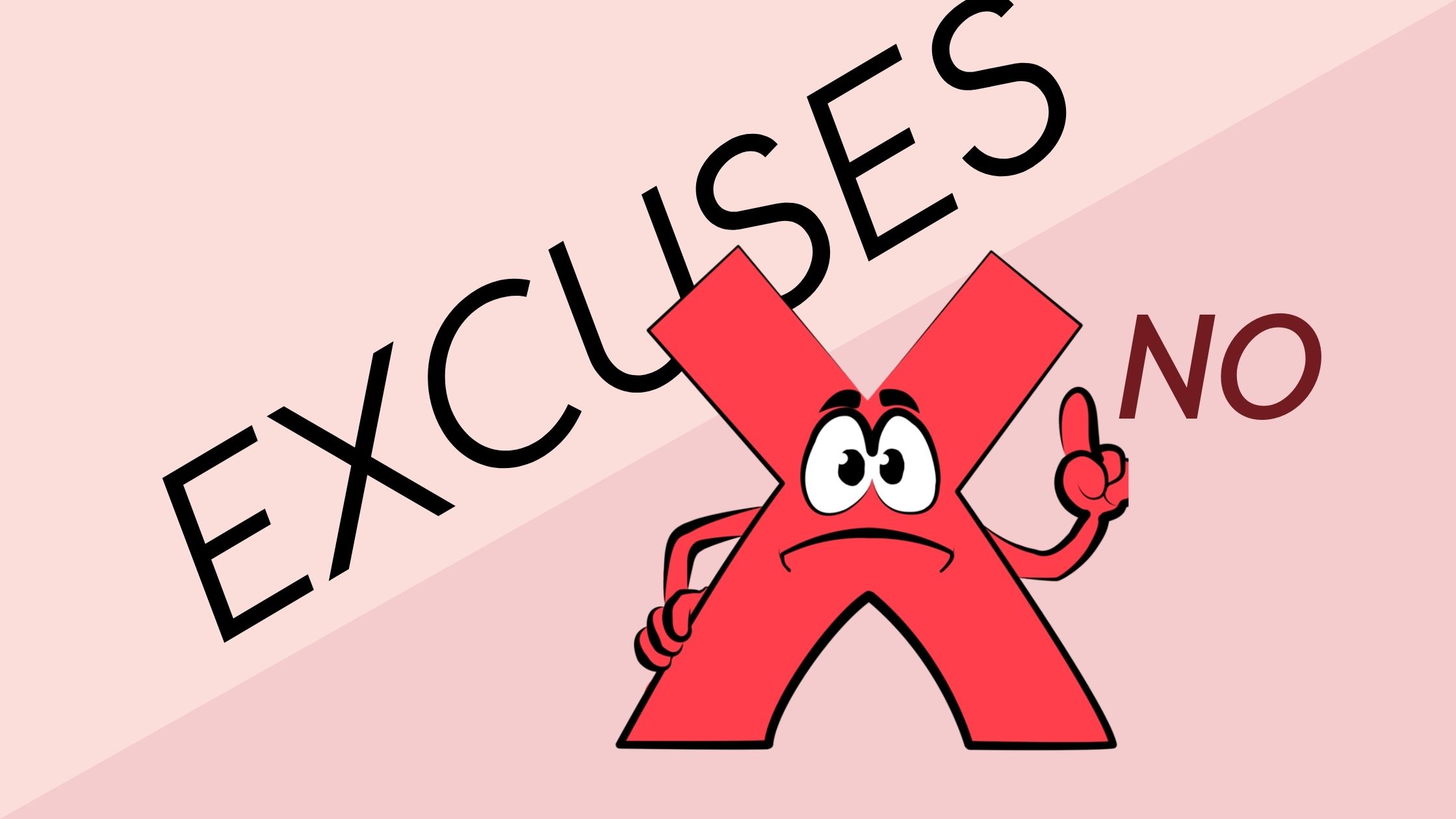
SAY NO TO THE EXCUSES!
In general, for any change, new activity, or new habit you want to include in your lifestyle, your mind will generate excuses and find many reasons to prevent it. The most common excuses for meditation are:
THE LACK OF TIME
Each of us has 24 hours a day, which depends strictly on how we organize our program and decide to channel the energy for different activities.
Suppose you have time for specific necessary or less necessary activities such as watching TV, surfing the Internet, reading emails, playing online games, spending time with friends, or on social media. Don’t you have time to spend a few minutes every day just for yourself?
One thing I am telling you for sure. When meditation becomes a ritual in your lifestyle, you will begin to have time for everything. Why? Because meditation focuses and clears the mind more than any other activity. You will also enjoy a restful sleep, and your mind will be entirely centered. In this way, you will make decisions faster and relate to each activity with ease, concentration, and efficiency.
You will adopt a lifestyle that will stimulate you and allow you to identify behaviors that drain your energy and replace them with beneficial and effective ones. Please take it as a challenge! Meditate daily, twice a day for 15 days, and you will see how time will expand in your favor.
NOT FEELING THE EFFECTS
Due to the misconception about what meditation should be, another common excuse used is not feeling the effects. If you expect to live unique experiences or to still your body and mind right away, but instead, you swing from the object of attention to thoughts, and vice versa, you may think that meditation does not work for you or that you do something wrong, and you will want to give up.
But as I specified during the article, the effects of meditation can be noticed in the rest of the hours when you carry out normal daily activities. So, don’t worry anymore, just be patient with yourself. Keep meditating, and you will notice how, after a few weeks, there will be changes in how you relate to life, stress, disappointments, or unsatisfied needs.
For this transformation to take place, you must constantly experience that state of peace and silence. Optimal would be 30 minutes twice daily, recommendable in the morning and the evening.
Meditate, and you will learn to live again, be more open to change, and maintain a balance, even when the surrounding chaos reigns.
Your thoughts, choices, decisions, and actions will become more conscious daily, leading to more intuitive and healthy behaviors.
You will realize that you will have a broader perspective of possibilities, become calmer and more creative, see things more clearly, and enjoy more what life has to offer. You will be consistent in what you think, say, and do.
THE FEAR OF SELF-KNOWLEDGE
Meditation seeks to discover the truth about the nature of Consciousness.
Each of us has an emotional package accumulated over time, which we are more or less aware of.
When you have to open your emotional package and face yourself entirely, it can often be scary because there is usually chaos.
Chaos generated by you, by your repressed emotions, by a painful past, by many failures, which implies the courage to face and overcome them. But only if you make this inner journey will you be able to be free and happy.
I DON’T KNOW HOW!
With so many types of meditation and different techniques through which it can be done, it is no wonder a beginner can be confused when practicing meditation.
You can always choose the guided meditation option (Insight Timer App, Headspace App) to join a group of meditators or meditate alone in silence, which I will explain below how to do it.
A simple exercise ideal for beginners, focusing on breathing, can be done for 5-10 minutes, gradually increasing its length.
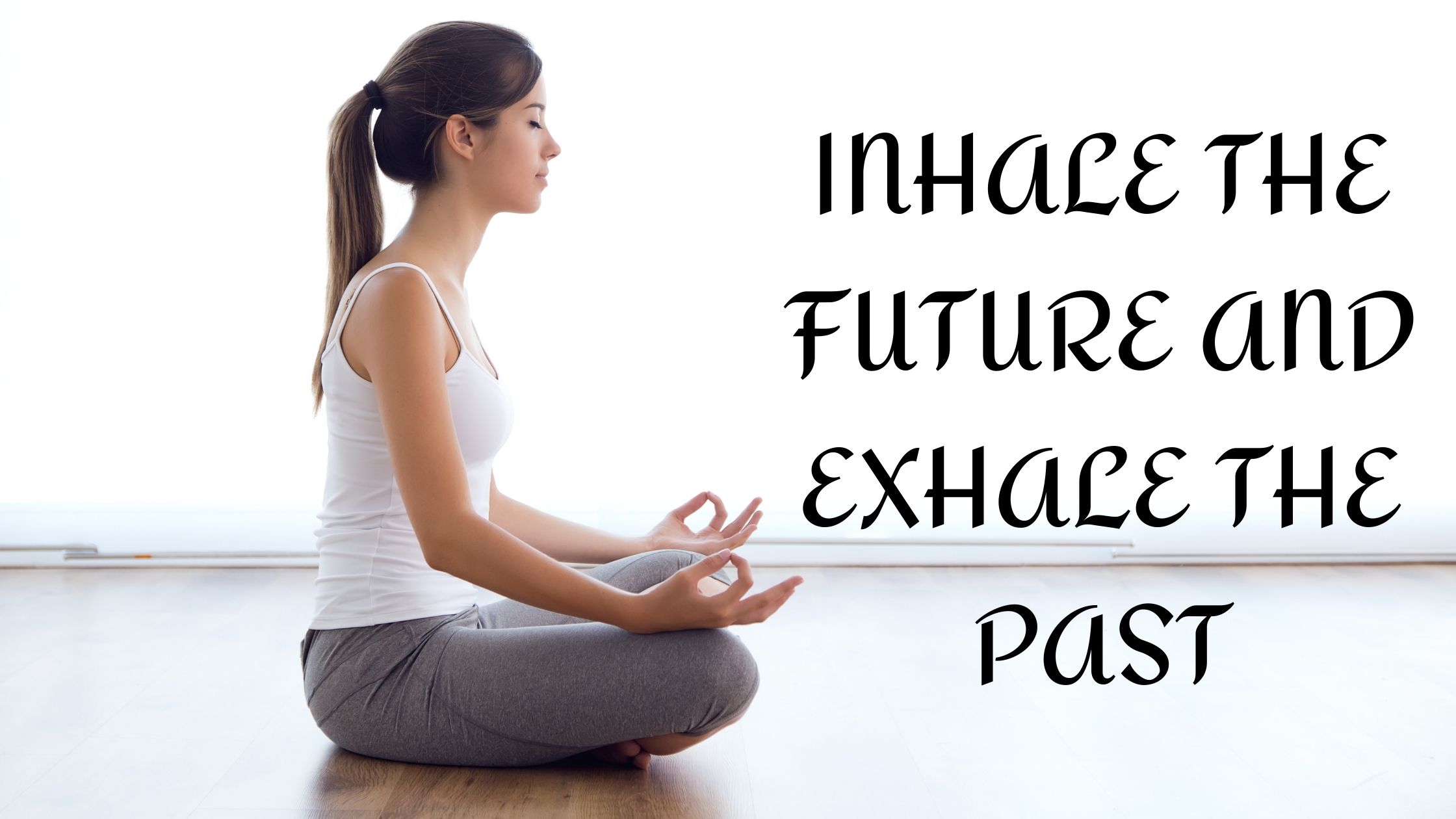
Sursa photo www.freepik.com
HOW TO MEDITATE?
To make and feel significant changes in your life, you only have to take a few moments of daily breaks from continuous activity. You have to balance the outer world with your inner world, and you can only do this through meditation.
But how to do it?
The answer is straightforward. You are staying free of occupations. Whenever you take action, your energy is transposed outside of you. When you are not acting in any way, and your body is completely relaxed, the power is installed in your center.
Considering the information in the article, all you have to do is GET STARTED.
You can use special incense sticks for meditation. (my favorite is Tulasi Nag Champa & Lavender, which promotes physical and mental relaxation).
- Find a quiet place and sit relaxed on a mat or cushion in a comfortable posture.
- Close your eyes and do nothing. Do not perform any activity. Just be your witness.
- Focus on your breath, feeling how the air goes in and out of your nostrils.
- Become one with the breath.
- With each exhalation, feel how you let go of all negative thoughts.
- With each inhalation, feel how you fill yourself with calm vitality.
- Every time your mind wanders and you become aware of it, gently bring it back to your breath.
If you have thoughts, hear a sound, experience certain sensations, or feel tension in certain body parts, witness everything that happens without identifying with them.
Observe everything, like a reflection in the mirror, without analyzing or judging. Let them flow naturally.
Contemplate their idea without thinking of them, and return your attention to the breath.
If you start paying attention to them, you will fall into the trap of your mind.
Just be an Observer.
The more you observe, the more your mind will free itself from thoughts, becoming more alert and aware.
It would be best if you had patience and depth. But when you walk this path, you will discover your true Self. Enjoy your moment of silence and assume meditation as a transformation without a limited or special time.
FINAL THOUGHTS ON MEDITATION GUIDE FOR BEGINNERS
When meditation becomes a ritual in your life, and you will devote more energy to your inner journey, only then will you experience being in pause and activities simultaneously, and you will discover the true meaning of possessing happiness and not of seeking it.
My dears, that was all. I hope the information was clear and easy for you to understand.
If you liked the article, please do not hesitate to spread the word with the world and leave us a comment with any experience, suggestions, questions, or concerns.
Any input from you is welcome, as it will help improve the readers’ experience on my website.
Till next time…
Master Your Breath To Be In Harmony With Yourself!
Founder of Dare & Be.
Contact: support@dareandbe.com
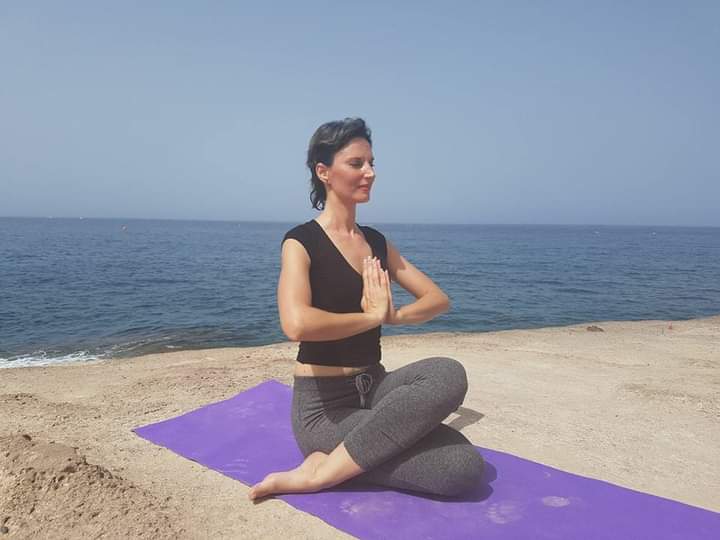
I have always wanted to be able to meditate but now, reading this, I realize that I have used every excuse in the book to avoid it. I have no time, I don’t know how and when I have tried, nothing happens. Thanks to your explanation, I now realize that it’s looking inside yourself, not waiting for something to happen. I’m going to do as you say and take 2-5 minutes tomorrow morning and work on it from there. Thank you for the motivation!
Hi Cynthia,
You very welcome. Thank you for stopping by. The important thing is that you get the basic idea and do not create more misconceptions. Meditation is the journey to your soul, in which you must be the observer of your own existence.
Start small, with a few minutes. As I said, important is to start and be persistent.